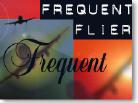|
When airline tickets won't do
|
 |
February 18, 1998: 2:52 p.m. ET
Chartering flights or purchasing private planes might actually be cost-effective
|
NEW YORK (Biztravel.com) - Ten years ago, Rudder Williams, owner of the Scottsboro, Ala.-based Skyline Oil Company, used to drive 200 miles or more a day to make sales visits to his clients.
Today, after a one-time expenditure of $30,000, Williams is the proud owner of a four-seat Cessna 172 prop plane. He rents hangar space at Scottsboro Municipal Word Field for $110 a month - one-third the cost of a New York City garage space -- and flies the plane at a cost of $56 an hour for fuel. He has it repaired by a fixed-base operator only when something goes wrong, much like taking a car to the local mechanic.
In his Cessna, he reaches four to five customers a day within a 300-mile radius. "I couldn't do that in a week in my car," Williams says. Flying to customers has boosted his business by 15-20 percent.
More and more businesses are recognizing that owning, chartering, or purchasing fractional ownership of a company airplane can lead to more business.
"It's not just a matter of the cost of the airplane vs. the cost of an airline ticket," says Robert Mark, principal of Mark Communications, an aviation marketing company in Evanston, Ill. "You have to factor in the amount of time an executive wastes waiting for connecting flights or being forced to stay overnight on the road instead of flying direct."
Buying your own plane
"The decision to purchase an aircraft is like acquiring any capital equipment," notes Warren Morningstar, director of media relations at the Aircraft Owners and Pilots Association.
Before deciding to buy a plane, companies should figure out monthly acquisition costs, insurance rates, hangar fees, maintenance and fuel costs and tax considerations. Companies owning a fleet of planes might need to hire a pilot and maintenance crew, but others can source out maintenance duties to a fixed-base operator that handles aviation services from a small airport.
The range of aircraft available today is staggering. A company can purchase a used six-seat, twin-engine piston plane for $150,000; a new ten-seat King Air 300 turbo-prop for $3 million; or a fully-equipped, 15-seat Gulfstream 5 jet that can travel up to 5,000 miles without refueling for $32 million. Determining typical business trip destinations and who will most often use the plane can help companies decide which type of aircraft to acquire.
Chartering a flight
Other companies elect to charter, rather than purchase, private airplanes. Chartering can help a company reduce its overhead and allow several executives to reach multiple destinations in a limited amount of time.
Betty Williams, assistant to the CEO of Alliant Foodservice of Deerfield, Ill., says that her company charters planes several times a year because chartering is "faster and more convenient" than fitting into an airline's schedule.
Mike Davis, president of Majestic Air Service, a charter company based at Frederick Municipal Airport in Frederick, Md., says that unlike owners, charter clients are not responsible for amortization costs, rent, insurance or maintenance fees.
At $1,600 an hour for an eight-seat Lear jet, chartering can be an expensive option, but, as Davis notes, the expense can be justified by the fact that "sitting in an airplane terminal for several hours is a waste."
Majestic Air recently took five executives to Milwaukee to make a morning presentation, then flew them to Houston where they stayed overnight, and finally to Denver and New York for two more meetings the next day. At a total cost of $30,000, the three-day chartered itinerary proved to be a worthwhile time saver.
"Moving five executives through six cities by scheduled airlines in three days could not have been done very easily," says Davis.
Jet sharing
Another option that is growing in popularity is fractional ownership. The two largest jet fractional ownership companies in the U.S. are Dallas-based Business Jet Solutions (owned by AMR and Bombardier) and Executive Jet Aviation of Columbus, Ohio.
At Business Jet Solutions, companies can acquire one-eighth ownership of a seven-seat Lear Jet 31, allowing them to fly 100 hours a year for $143,000 a year over a five-year contract. Part of that fee is returned to the fractional owner at the end of the lease, which Business Jet uses to repurchase the plane. There is also a $5,820 monthly management fee for maintenance.
"If you need the plane for 500 hours a year, it makes sense to buy. But for 100 hours, fractional ownership may be [more] cost-effective," says Robert Pruneau, director of marketing at Business Jet Solutions.
Ultimately, when chartering or buying fractional ownership, ensure that the company's safety record is sound and be certain to check references of past and present clients. 
|
|
|
|
|
 |

|

